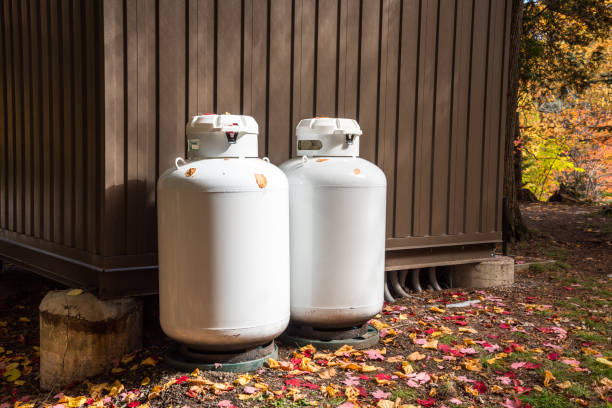Essential Safety Protocols for Propane Storage

Proper propane storage and handling are crucial components of safety. Here are a variety of essential protocols to ensure safety and prevent accidents, with detailed explanations to help you implement these practices effectively.
Store in Ventilated Areas
Always store propane tanks in well-ventilated areas to prevent gas buildup, which can lead to dangerous situations. Propane is heavier than air and can accumulate in low-lying areas, creating a significant risk of explosion or fire. Outdoor storage or well-ventilated sheds are ideal. Ensure the storage area is free from any potential sources of ignition, including electrical equipment and open flames.
Keep Tanks Upright
Store propane tanks upright to ensure the pressure relief valve functions correctly. This position minimizes the risk of leaks and allows the valve to vent excess pressure safely. It’s important to secure the tanks to prevent them from falling over, especially in areas prone to earthquakes or heavy winds. Use tank stands or mounting brackets to keep them stable.
Regular Inspections
Inspect tanks and equipment regularly for damage or leaks. A routine inspection checklist should include checking for dents, rust, and other signs of wear and tear. Also, be sure to listen for hissing sounds that could indicate a leak. Use a soap solution to detect leaks around the valve and connections. Regular maintenance helps detect issues early and prevents accidents. Document all inspections and maintenance activities to ensure full compliance with safety regulations.
Use Approved Containers
Only use containers and tanks approved for propane storage. Ensure that all equipment meets safety standards set by relevant authorities, such as the American Society of Mechanical Engineers (ASME) or the Department of Transportation (DOT). Approved containers are designed to withstand the pressures and conditions associated with propane storage. Never use makeshift containers or repurpose other types of tanks for propane.
Safe Handling Practices
When handling propane, always close the valve before connecting or disconnecting tanks. This prevents gas from escaping and reduces the risk of fire. Use proper tools to avoid damaging connections and follow the manufacturer’s instructions for handling. Wear protective gear, such as gloves and safety goggles, to protect yourself from potential burns or other injuries. Ensure that all personnel handling propane are trained in these safe handling practices.
Emergency Procedures
Know and communicate emergency procedures for leaks or fires. Develop a comprehensive emergency response plan that includes steps to take in case of an event of this nature. Ensure all staff members are familiar with this plan and conduct regular drills to reinforce it. Keep a fire extinguisher nearby, specifically rated for flammable liquids and gases, and train staff on how to use it. Additionally, install gas detectors in storage areas to provide early warnings of leaks.
Additional Safety Tips
• Temperature Control: Store propane tanks away from extreme heat sources and direct sunlight, as high temperatures can increase the internal pressure of the tank, leading to potential hazards.
• Labeling and Signage: Clearly label all propane storage areas with warning signs to alert personnel and visitors of the presence of flammable gas.
• Restricted Access: Limit access to propane storage areas to authorized personnel only. Use locks and fencing to prevent unauthorized access.
• Spill Containment: Have spill containment measures in place, such as absorbent materials, to quickly manage any accidental releases.
Following these detailed safety protocols for propane storage and handling – ventilated storage, upright tanks, regular inspections, approved containers, safe handling, and emergency preparedness – ensures a secure environment and prevents accidents. Implementing these measures protects your property, personnel, and customers while also ensuring compliance with safety regulations, thereby creating a culture of safety for all involved.














